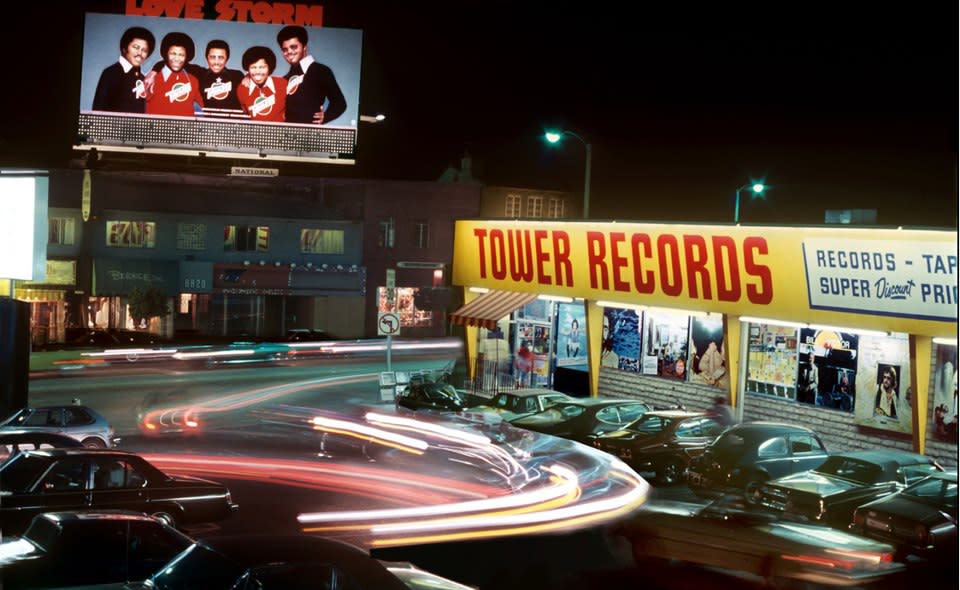Film Review: ‘All Things Must Pass’

While focusing on the rise and demise of Tower Records, the fallen retail giant that once billed its flagship location as “The Largest Record-Tape Store in the Known World,” actor-turned-documentarian Colin Hanks also offers glances at the bigger picture of 21st-century recording industry upheavals in “All Things Must Pass.” The movie’s primary audience likely will be baby boomers and Gen Xers who fondly recall the joys of discovery during shopping sprees in brick-and-mortar music stores. But even viewers who have never owned, or even played, a vinyl record may be fascinated by the cautionary tale that Hanks spins beneath the surface of his sentimental celebration.
Hanks and writer Steven Leckart are incalculably fortunate to have at their disposal the colorful commentary of Russ Solomon, the loquacious octogenarian who started selling records in the back of his father’s Sacramento drugstore in 1960, and steadily built a global chain of Tower Records outlets emblazoned with trademark red-and-yellow signage. Each store was a mammoth music marketplace where virtually every recording imaginable was displayed for easy browsing, purposeful shopping and/or impulse buying. Arguably the most famous of the bunch: the legendary Los Angeles location on the Sunset Strip, where everyday people and showbiz superstars rubbed shoulders while traversing the aisles.
Elton John — who considered it “a ritual” to visit the Sunset Strip store during every L.A. visit — proudly states during one of the film’s many interviews: “I spent more money in Tower Records than any other human being.” Another satisfied customer: John Lennon, who actually cut a wacky radio commercial for Tower back in the day.
Solomon shares screen time with several former employees and associates, all of whom wax nostalgic about the wild-and-crazy early days of Tower Records expansion, when sales clerks hired (literally) off the street could work their way up to management positions, and lunch breaks often expanded to allow for excessive consumption of booze and drugs. (One interviewee recalls listing the cost of “handtruck fuel” — i.e., cocaine — in company ledgers.) The opening of the first Tower store in New York was cause for tearful exuberance. The opening of the first store in Japan only served to increase company-wide confidence that the fun — and the moneymaking — would never stop.
But it did. Even before the advent of Napster and other streaming services in the 1990s, Tower Records — much like the rest of the record industry — suffered dearly for its inability (or unwillingness) to adapt and evolve. The artificially high price of CDs, along with the end of the CD single, rankled customers who gradually rebelled against paying for tracks they didn’t care to hear. It didn’t help much when big-box retailers such as Best Buy and Walmart started slashing CD prices in a loss-leader campaign to increase customer traffic. And it helped even less when steadily mounting debt led to management shakeups and draconian layoffs, desperate measures that proved to be too little, too late, to keep Tower Records afloat.
In 1999, the documentary duly notes during its opening minutes, Tower Records recorded $1 billion in earnings. Five years later, the chain entered bankruptcy.
The story of Tower Records is an all-too-familiar one — one frequently told about other once-thriving retail chains that have found themselves on the wrong side of history. (Did somebody say Radio Shack? Borders?) It is much to the credit of Hanks and his collaborators that “All Things Must Pass” makes this particular iteration of the oft-told tale come across as freshly compelling, even poignant.
With the help of lensers Nicola Marsh, Bridger Nielson and Neil Lisk, and editor Darrin Roberts, Hanks has fashioned an interweaving of talking-heads interviews, archival material and retailer history lesson that is soundly constructed, briskly paced and, in the end, affectingly wistful. The apt title, by the way, is the message — drawn from George Harrison’s classic pop song — that appeared on a banner hung outside the original Tower Records store in Sacramento during its final days of operation.
A final irony: “All Things Must Pass” should enjoy a healthy run on the festival circuit, and may even have limited theatrical exposure. But, like the music that used to be Tower Records’ stock-in-trade, it will doubtless reach most people through digital streaming. And so it goes.
Related stories
Film Review: 'A Wonderful Cloud'
Film Review: 'The Damned: Don't You Wish That We Were Dead'
Get more from Variety and Variety411: Follow us on Twitter, Facebook, Newsletter
